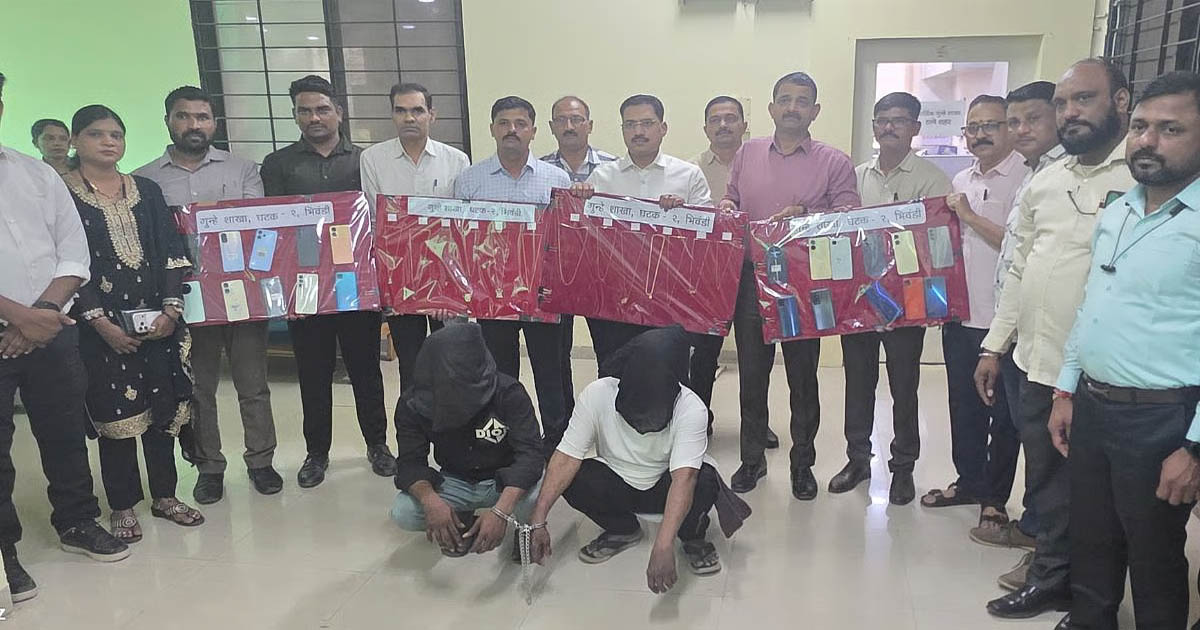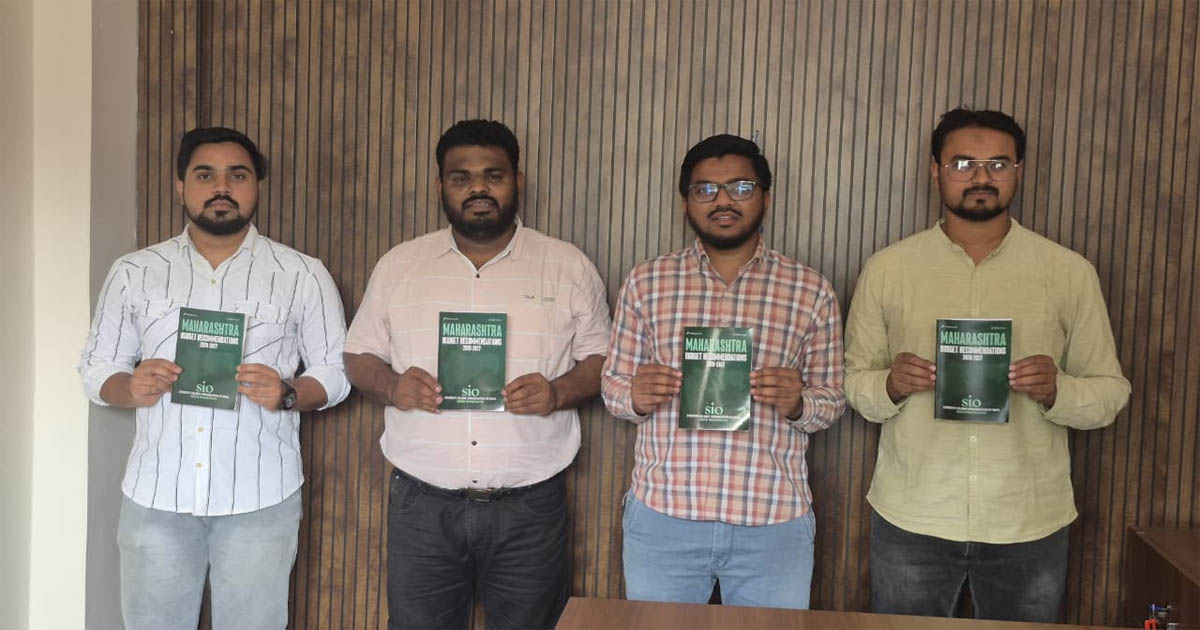Maharashtra
The AM Residency Built on Waqf Property: A Builder’s Example of Dishonesty? Or Muslim Leaders’ Compromise with the Mission Waqf Property ?

Mumbai: In our previous report, we explained how corrupt officials and builders are colluding to sell homes meant for poor footpath dwellers to the rich. After the Mumbai Press report, the government authorities took action, and a team of BMC officers arrived at the AM Residency in Mazgaon. Afterward, a man named Sheru started misleading the higher authorities. According to the information received, the honest builder of AM Residency, Salim Motorwala, in his statement, informed BMC officials that he had given homes in his complex to all 20 slum dwellers and had shown the allotment letters for all 20 homes to the BMC officials. However, he did not mention that only the allotment letters were given, and the actual homes were not provided. Later, Motorwala’s company transferred the ownership of those homes to the names of his relatives, making them the owners.
However, BMC’s final report is still pending, which will decide whether Motorwala’s group gets a clean chit or the poor slum dwellers receive homes.

Now, let us explain why all the Muslim leaders have remained silent spectators in the AM Residency case.
According to government documents, the 3,596 square meter land of AM Residency in Mazgaon was under the Maharashtra Waqf Board. This land was leased by the Maharashtra Collector to the Dawood Bhai Musa Bhai Jariwala Charity Trust for 99 years, so that the trust could serve the poor Muslims. The actual ownership of this land remained with the Maharashtra government, which gave it to the trust for 99 years, starting from 1882 and ending in 1978. After 1978, the trust and the Waqf Board were supposed to return the land to the Maharashtra government. However, it is rare in India that government land is returned honestly to the government. The same happened with this land. The trust and the Waqf Board kept their claim on the land, and in 2009, about 30 years later, the Waqf Board illegally gave this land to Salim Motorwala and his associate Suhail Khadir for redevelopment. In doing so, they seized thousands of crores of government property. This land had been allocated for building schools, colleges, or hospitals for Muslims, but the trust and Waqf Board kept the land unused for 99 years and then sold it to builders at throwaway prices, after taking bribes.
When Mumbai Press informed the Collector of Mumbai about this, he was shocked because he was unaware that the Waqf had sold the land to builders instead of returning it to the government, and the builders were constructing homes on it and selling them to Muslims for crores of rupees. Mumbai Press then informed Maharashtra Chief Minister Devendra Fadnavis, who ordered an inquiry into the matter. When Mumbai Press tried to ask Salim Motorwala why, despite being a devout Muslim, he took control of Waqf property that was meant for the welfare of Muslims, he avoided commenting on the matter and did not provide any response.
Crime
Thane Crime Branch Busts Chain And Mobile Snatching Racket, Solves 16 Cases Across Region

Thane, Feb 14: In a significant crackdown on street crimes, the Thane Crime Branch has successfully apprehended two suspects involved in a series of chain and mobile snatching incidents. The operation has led to the resolution of at least 16 pending cases across several jurisdictions, including Thane, Bhiwandi, and Pune.
Acting on a tip-off and technical surveillance, a special team led by Deputy Commissioner of Police (DCP) Amarsingh Jadhav initiated a targeted drive against rising street robberies. The investigation led to the arrest of two key suspects:
Ravindra Dhanaji Bhosle (24): Arrested on February 4, 2026, in the Kalyan-Bhiwandi area. Following his interrogation, police recovered 45 grams of gold jewellery valued at approximately ₹3.20 lakh. Bhosle has been linked to 13 cases of chain snatching spanning Bhiwandi, Kalyan, Thane, Ulhasnagar, Karjat Railway, and Pune.
Dinesh Pandurang Chator: Arrested for his involvement in mobile snatching. His apprehension led to the recovery of 21 high-end mobile phones and jewellery, with a total estimated value of ₹8.55 lakh.
The suspects reportedly targeted victims in crowded areas and transit points. DCP Jadhav informed the press that the team utilised a combination of CCTV footage analysis and confidential informant networks to track the duo’s movements.
“This operation is a result of a coordinated effort by our special team. We have successfully recovered stolen property worth over ₹11 lakh and cleared 16 FIRs across multiple police stations,” stated DCP Jadhav.
In a significant breakthrough for regional security, the Thane Crime Branch has successfully resolved 16 cases of chain and mobile snatching. The extensive investigation spanned multiple jurisdictions, including Thane, Bhiwandi, Kalyan, Pune, and Karjat.
This coordinated effort led to the recovery of key assets, including 45 grams of gold and 21 mobile phones, with a total estimated recovery value of approximately ₹11.75 lakh. Following this success, the Thane Police have urged citizens to remain vigilant and report any suspicious activity to local authorities.
Meanwhile, further investigations are currently underway to determine if the apprehended suspects are part of a larger organised criminal syndicate or are linked to additional unsolved cases across the region.
Maharashtra
Andheri: Flower Festival inaugurated in the presence of actor Akshay Kumar, Mumbai Municipal Corporation Commissioner Bhushan Gagrani, MLA Amit Sattam and Haroon Khan

Mumbai: Replicas of musical instruments made of various colorful flowers… peacocks, butterflies, elephants, horses and sanais adorned with flowers, choghdhe, trumpets… abundance of flowers… amazing petunias, broccoli, salvia plants… fragrant flowers with marigolds, roses, mogra etc… plants… vines, vegetables… and for all this, decorated with fertilizers, pots etc., the Andheri Flower Festival was inaugurated today by actor Padma Shri Shri Akshay Kumar. On this occasion, Mumbai Municipal Corporation Commissioner Bhushan Gagrani, MLA Amit Satam, MLA Haroon Khan, Corporator Sudha Singh, Corporator Deepak Kotekar, Corporator M Rohan Rathod, Corporator Anish Makwani, Corporator Sunita Mehta, Corporator Vitthal Bhanderi, Corporator Rupesh Savarkar, Corporator Savarkar, Corporator Bhagya Shri Kapse, Assistant Commissioner of West Zone Chakrapani Ale, Municipal Corporation Parks Superintendent Jitendra Pardeshi and various dignitaries were present. Recently, the Mumbai Flower Festival was organized in South Mumbai by the Mumbai Municipal Corporation. About 1.5 lakh Mumbaikars attended and enjoyed the exhibition. After this exhibition, the Flower Festival is now being organized in Andheri too. This two-day festival is being organized at the Pushpa Narsi Adyar of the Municipal Corporation located on the road. The flower festival is open to all citizens on Saturday, February 14 and Sunday, February 15, 2026 from 8 am to 9 pm. The Andheri Flower Festival is decorated with colorful flowers. There are also halls for trees, pots, fertilizers, garden tools, various plants and tree nurseries, flower medicines, pesticides, sprayers, fertilizers, etc. Along with this, various bonsai varieties, ornamental plants, flowers, vegetables, medicinal plants are also put up for display.
Actor Akshay Kumar said, Mumbai is a very busy city. The Municipal Corporation has organized a beautiful flower festival. This flower festival should be held twice a year. One thing is felt in the flower festival, that is, to come here and ‘stop’. ‘Stopping’ is very important in life. Come and be calm in life. Come here, sit, look… These flowers want to tell you something, that they bring ‘peace’ in your life. Feed yourself. Don’t compete with anyone, just let yourself bloom and when everyone blooms, then only a ‘garden’ is formed. Everyone has many works. I also work a lot. But I completely relax myself after 6 pm. Because the most important thing is health. We should take great care of our health and the flower festival makes you aware of this. Bhushan Gagrani, Commissioner of Mumbai Municipal Corporation, said, the flower festival is an important step taken to protect the environment of Mumbai. We want to take this campaign and this heritage to a higher level, so that every Mumbaikar is involved in it. This treasure of nature should not belong to the municipal corporation or any one person, it is the treasure of every Mumbaikar. We all want to protect it.
MLA Mr. Amit Sattam said that we all should keep Mumbai city clean and beautiful at all times. For this, the actor presented the idea of a cleanliness competition. In which Andheri should compete with Parla, Parla with Santa Cruz, Santa Cruz with Bandra, Bandra with Mahim, Mahim with Dadar and Dadar with Malabar Hill, he suggested organizing a cleanliness competition. We will definitely think about this in the coming time. Mumbai is currently at number nine in Swachh Bharat. MLA Sattam also said that we will try to bring Mumbai to number one soon.
Local citizens, students of municipal schools, youth, senior citizens etc. are visiting the first flower fair in Andheri.
Maharashtra
SIO recommends educational and socio-economic inclusion in Budget 2026-27, demands a budget based on justice and fairness

Mumbai: The Students Islamic Organisation of India (SIO), Maharashtra South Zone has submitted its recommendations to the state government for the 2026-27 budget. The report calls for a planned systemic change in the education sector, urging the Maharashtra government to allocate at least 20% of the total budget expenditure for education to ensure the constitutional values of equity and inclusive development.
Despite Maharashtra’s rapid economic growth, the report highlights the lack of development opportunities for the Muslim community. Citing decades of data from the Sachar, Kundu, and Mahmud-ur-Rehman committees, it has been observed that Muslims often lag behind Scheduled Castes (SC) and Scheduled Tribes (ST) in key human development indicators, especially in urban and backward districts.
Key points and recommendations:
- Education Crisis in Urdu Primary Schools
The report reveals a clear disparity in student retention: Only 10 out of every 100 students in Urdu medium schools reach the Higher Secondary Certificate (HSC) level, while the number is 27 in Marathi medium schools.
SIO Demands:
Infrastructure Development: The state government should address the fact that 9.1% of these schools lack boys’ toilets and 6.9% lack girls’ toilets.
Teacher Retention: Special attention should be paid to urgent recruitment and regularization of contract teachers to address the student-teacher ratio.
- Addressing the Shortage of Digital and Other Resources
Currently, only 7% of Urdu medium schools have computer laboratories and the computer-to-student ratio is 81:1, SIO demands dedicated funding for smart classrooms and AI-powered learning tools.
- Reforms in Secondary and Higher Education
To prevent dropouts at the transition stage, SIO suggests:
Extension of RTE Act: The age limit of Right to Education (RTE) Act should be extended to 18 years.
New Institutions: A Central University should be established in Maharashtra to maintain the quality of education and a Higher Education Regulatory Authority should be set up.
Career Opportunities: Vocational exposure at the upper primary stage and career counselling cells should be introduced in all junior colleges.
- Financial Aid and Minority Welfare
The organization demands the government to increase the scholarship allocation to fill the gap left by the closure of MANF and pre-matric scholarships, while ensuring timely and transparent distribution to economically weaker families.
- Urban Development
Beyond the classroom, SIO proposes special interventions in minority-centric areas, including public parks, libraries, student centres and better sanitation management, etc.
In this regard, SIO South Maharashtra President Uzair Ahmed Rangrez said, “The 2026-27 budget is a major opportunity to correct long-standing regional and social imbalances. We are not just asking for funding, we are asking for a roadmap for social justice. By prioritizing these recommendations, the government can ensure that every citizen is included in the ‘Maharashtra Development Agenda’, regardless of the region they come from or the language they speak.” This was informed here today by
Awais Siddiqui
State Secretary, Public Relations
SIO, South Maharashtra.
-

 Crime4 years ago
Crime4 years agoClass 10 student jumps to death in Jaipur
-

 Maharashtra1 year ago
Maharashtra1 year agoMumbai Local Train Update: Central Railway’s New Timetable Comes Into Effect; Check Full List Of Revised Timings & Stations
-

 Maharashtra1 year ago
Maharashtra1 year agoMumbai To Go Toll-Free Tonight! Maharashtra Govt Announces Complete Toll Waiver For Light Motor Vehicles At All 5 Entry Points Of City
-

 Maharashtra1 year ago
Maharashtra1 year agoFalse photo of Imtiaz Jaleel’s rally, exposing the fooling conspiracy
-

 National News1 year ago
National News1 year agoMinistry of Railways rolls out Special Drive 4.0 with focus on digitisation, cleanliness, inclusiveness and grievance redressal
-

 Maharashtra1 year ago
Maharashtra1 year agoMaharashtra Elections 2024: Mumbai Metro & BEST Services Extended Till Midnight On Voting Day
-

 National News1 year ago
National News1 year agoJ&K: 4 Jawans Killed, 28 Injured After Bus Carrying BSF Personnel For Poll Duty Falls Into Gorge In Budgam; Terrifying Visuals Surface
-

 Crime1 year ago
Crime1 year agoBaba Siddique Murder: Mumbai Police Unable To Get Lawrence Bishnoi Custody Due To Home Ministry Order, Says Report






















